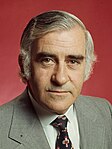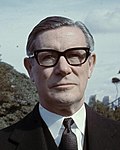
John Malcolm Fraser was an Australian politician who served as the 22nd prime minister of Australia from 1975 to 1983. He held office as the leader of the Liberal Party of Australia, and is the fourth longest-serving prime minister in Australian history.

Sir John Grey Gorton was an Australian politician, farmer and airman who served as the 19th prime minister of Australia from 1968 to 1971. He held office as the leader of the Liberal Party of Australia, having previously served as a senator for Victoria. He was the first and only member of the upper house of the Parliament to assume the office of prime minister.

Sir William McMahon, also known as Billy McMahon, was an Australian politician who served as the 20th prime minister of Australia from 1971 to 1972. He held office as the leader of the Liberal Party of Australia, and previously held various ministerial positions from 1951 to 1971, the longest continuous service in Australian history.

Andrew Sharp Peacock was an Australian politician and diplomat. He served as a cabinet minister and went on to become leader of the Liberal Party on two occasions, leading the party to defeat at the 1984 and 1990 elections.

Sir Billy Mackie Snedden, was an Australian politician who served as the leader of the Liberal Party from 1972 to 1975. He was also a cabinet minister from 1964 to 1972, and Speaker of the House of Representatives from 1976 to 1983.

John Douglas Anthony was an Australian politician. He served as leader of the National Party of Australia from 1971 to 1984 and was the second and longest-serving deputy prime minister, holding the position under John Gorton (1971), William McMahon (1971–1972) and Malcolm Fraser (1975–1983).

Donald Leslie Chipp, AO was an Australian politician who was the inaugural leader of the Australian Democrats, leading the party from 1977 to 1986. He began his career as a member of the Liberal Party, winning election to the House of Representatives in 1960 and serving as a government minister for a cumulative total of six years. Chipp left the Liberals in 1977 and was soon persuaded to lead a new party, the Democrats who, he famously proclaimed in 1980, would "keep the bastards honest". He was elected to the Senate on 10 December 1977 and led the party at four federal elections. From 1983 it held the sole balance of power in the Senate.
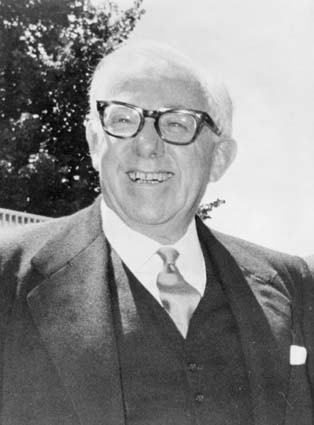
William Charles Wentworth, usually known as Bill Wentworth and sometimes referred to as William Charles Wentworth IV, was an Australian politician. He was a member of the Liberal Party for most of his career and held ministerial office in the governments of John Gorton and William McMahon, serving as Minister for Social Services (1968–1972) and Minister in charge of Aboriginal Affairs (1968–1971). Wentworth served in the House of Representatives from 1949 to 1977, representing the New South Wales seat of Mackellar. He frequently crossed the floor and served his final months in parliament as an independent.
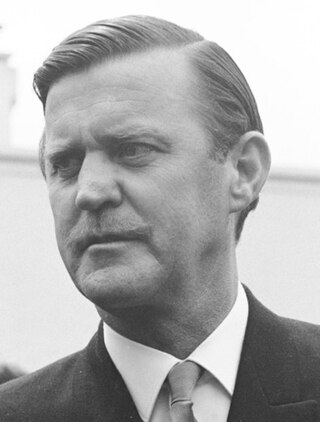
Sir Denis James "Jim" Killen, was an Australian politician and a Liberal Party member of the Australian House of Representatives for almost 30 years, 1955 to 1983, representing the Division of Moreton in Queensland. He served as Vice-President of the Executive Council, Minister for Defence and Minister for the Navy during his parliamentary career.

Sir Phillip Reginald Lynch KCMG was an Australian politician who served in the House of Representatives from 1966 to 1982. He was deputy leader of the Liberal Party from 1972 to 1982, and served as a government minister under three prime ministers.

The 1972 Australian federal election was held in Australia on 2 December 1972. All 125 seats in the House of Representatives were up for election, as well as a single Senate seat in Queensland. The incumbent Liberal–Country coalition government, led by Prime Minister William McMahon, was defeated by the opposition Labor Party led by Gough Whitlam. Labor's victory ended 23 years of successive Coalition governments that began in 1949 and started the three-year Whitlam Labor Government.
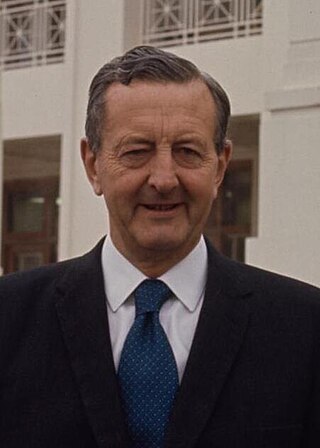
Leslie Harry Ernest Bury CMG was an Australian politician and economist. He was a member of the Liberal Party and served in the House of Representatives between 1956 and 1974, representing the Division of Wentworth. He held ministerial office in Coalition governments for nearly a decade, serving as Minister for Air (1961–1962), Housing (1963–1966), Labour and National Service (1966–1969), Treasurer (1969–1971) and Foreign Affairs (1971).
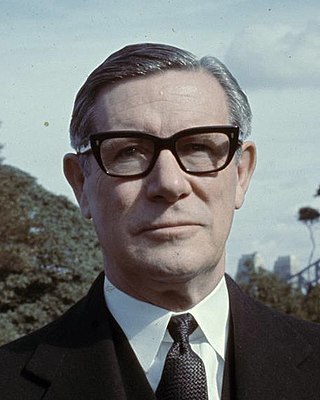
Sir Nigel Hubert Bowen, was an Australian lawyer, politician and judge. He was a member of the Liberal Party and served in the House of Representatives from 1964 to 1973, representing the New South Wales seat of Parramatta. He held senior ministerial office in multiple Coalition governments, serving as Attorney-General, Minister for Education and Science (1969–1971), and Minister for Foreign Affairs (1971–1972). After the Coalition lost the 1972 election he was an unsuccessful candidate to replace William McMahon as Liberal leader, losing to Billy Snedden by a single vote. After leaving politics he served as the inaugural chief justice of the Federal Court of Australia (1976–1990).
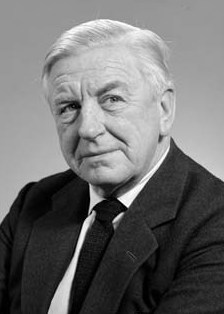
Sir Magnus Cameron Cormack KBE was an Australian politician. He was a member of the Liberal Party and served multiple terms as a Senator for Victoria, including as President of the Senate from 1971 to 1974.

The Gorton government was the federal executive government of Australia led by Prime Minister John Gorton. It was made up of members of a Liberal-Country Party coalition in the Australian Parliament from January 1968 to March 1971.

The McMahon government was the period of federal executive government of Australia led by Prime Minister William McMahon of the Liberal Party. It was made up of members of a coalition between the Liberal Party and the Country Party, led by Doug Anthony as Deputy Prime Minister. The McMahon government lasted from March 1971 to December 1972, being defeated at the 1972 federal election. Writing for the Australian Dictionary of Biography, Julian Leeser describes McMahon's prime ministership as "a blend of cautious innovation and fundamental orthodoxy".

A leadership election in the Liberal Party of Australia, the party of government in the Parliament of Australia, was held on 9 January 1968. It followed the disappearance and presumed drowning of previous leader Harold Holt, who had been declared dead on 19 December 1967. The contest was won by Senator John Gorton in a party room ballot; he was sworn in as prime minister the following day, replacing caretaker John McEwen.

A spill of the leadership of the Liberal Party of Australia took place on 21 March 1975. It came about as a result of Malcolm Fraser's continued dissatisfaction with the party's direction under Billy Snedden. Fraser's challenge was successful – he defeated Snedden by 37 votes to 27, thus becoming Leader of the Opposition.

The Liberal Party of Australia held a leadership spill on 7 November 1969, following the party's poor performance at the federal election on 25 October. Prime Minister John Gorton was re-elected as the party's leader, defeating challengers William McMahon and David Fairbairn.

The Liberal Party of Australia held a leadership spill on 10 March 1971. Prime Minister John Gorton called for a vote of confidence in his leadership, which was tied, prompting Gorton to resign. William McMahon subsequently defeated Billy Snedden for the leadership, and was sworn in as prime minister on the same day. Gorton was elected as his deputy, defeating Malcolm Fraser and David Fairbairn.
